Cinematic Adaptations of
The Legend of Madame White Snake
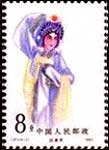 The legend of Lady White Snake & her maid or sister Green Snake is very likely the single most popular of many popular Beijing Opera standards, frequently adapted to the cinema. The opera story is commemorated in the 1983 postage stamp shown here, & in an old painting of Lady White Snake immediately below. The legend of Lady White Snake & her maid or sister Green Snake is very likely the single most popular of many popular Beijing Opera standards, frequently adapted to the cinema. The opera story is commemorated in the 1983 postage stamp shown here, & in an old painting of Lady White Snake immediately below.
The oldest versions of the legend are in folklore & literary ghost stories, but it was Chinese opera that first made the story ubiquitous in retellings for children's storybooks, mature novels, dramas, comedies, & musicals, & which set the main characters & their names more or less in stone.
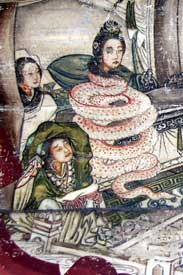 The primary characters are first of all Lady White, a serpent who after accumulating 1,000 years of merit is on the verge of rising to human status, & can take on human shape very easily. She has a pure & noble heart, but is also a good swordswoman, with sundry powers that are partly the result of her good merit, & partly hold-overs from her demonic origin. The primary characters are first of all Lady White, a serpent who after accumulating 1,000 years of merit is on the verge of rising to human status, & can take on human shape very easily. She has a pure & noble heart, but is also a good swordswoman, with sundry powers that are partly the result of her good merit, & partly hold-overs from her demonic origin.
Then there is Green Maid, who has 500 years of accumulated merit & is comparatively rambunctious. She was first the maid & disciple of Lady White, but over time they become like older sister & younger sister greatly devoted to one another.
Perhaps because heroines of the opera were played by female impersonators, there's a degree of ambiguous sexuality to White Snake & Green Snake, whose behavior toward one another is not always & strictly sisterly, & some cinematic treatments elaborate their erotic nature together.
Lady White has reached a level of merit where human emotion is within her capacity, & she falls in love with a mild mannered but rather weak-willed scholar usually called Xu Xian (or Hsu Sheng). Green Maid also develops an interest in him but being less advanced along the road to enlightenment, her attraction is more lusty than loving.
The primary antagonist is a Buddhist monk of great merit & power, Fa Hai, who sets out to "save" the scholar from the two demonesses, having failed to acknowledge that demonkind can transcend evil just as can humankind.
In the course of the tale the scholar will become ill & the serpent women must even do battle with mountain gods to win the herb of resurrection & save him. Often left out of the film versions is a final chapter in which the scholar & Lady White are parted when the Fa Hai successfully traps Lady White underneath a pagoda, & not until her son by Xu Xian grows to manhood is his mother delivered from captivity.
Film adaptations go all the way back to the silent film era, when the double-film Madam White Snake (Bai she zhuan shang ji, 1926; & Bai she zhuan xia ji, 1926) was an early production by the Shaw Brothers, directed by Shao Zuiweng.
The two-part silent film's success was gigantic, a hit throughout China & Southeast Asia. This success was signal in the Shaws being established as a permanent feature of Shanghai then Hong Kong cinema. It also helped to guarantee that traditional & period films would be a regular part of the Shaws' output.
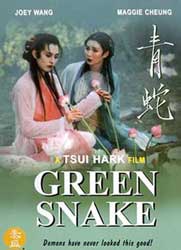 One of the best adaptations was directed by Tsui Hark, Green Snake (Ching Se, or Qing She, 1993), based on a novel by Lillian Lee (Li Bihua), who shifts much of the attention away from White Snake & toward Green. One of the best adaptations was directed by Tsui Hark, Green Snake (Ching Se, or Qing She, 1993), based on a novel by Lillian Lee (Li Bihua), who shifts much of the attention away from White Snake & toward Green.
Of the several adaptations of the Madame White Snake legend I've seen, I have found myself always fonder of Green Snake than White. Whether that's because I too lack full spiritual merit I don't know; I rather think it is because of her unrestrained wildness. Tsui Hark's film re-focuses the legend so that we get a great deal more of Green Snake than is usual.
Right from the opening-credits sequence it's obvious we're in for a treat, with an absolutely gorgeous theme song & a great soundtrack overall, & splendid cinematography, to the vision of hundreds of enslaved demons doing hard labor under the watchful gaze of the stubborn monk Fa Hai (Man Cheuk Chiu).
A spider (Feng Tien) seeking spiritual enlightenment has taken a priestly form & despite old age is running swiftly across the wild countryside. The reverend disguise is perfect, but our monk can nevertheless detect demonic things. Convinced that evil is always evil, he will not listen to the spider's pleas for mercy, & captures the old reverend in a beggar's bowl, imprisoning him beneath a pagoda.
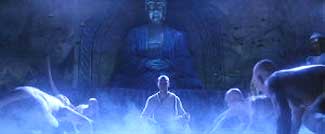 Finding shortly thereafter the spider-reverend's prayer beads, he detects a purity in their light, & for the first time begins to wonder if his own spiritual knowledge is flawed. He becomes fearful he may commited fault after merit, have done the wrong thing in imprisoning the spider. Finding shortly thereafter the spider-reverend's prayer beads, he detects a purity in their light, & for the first time begins to wonder if his own spiritual knowledge is flawed. He becomes fearful he may commited fault after merit, have done the wrong thing in imprisoning the spider.
This wonderful sequence is adapted from the traditional tale, though ordinarily it would be White Snake, toward the end of her adventures, who is imprisoned beneath the pagoda. Director Tsui Hark will present a variant climax for Lady White.
Fa Hai's spiritual wisdom in soon tested. While meditating in a cavern before a great statue of Buddha, erotic bald-headed monkey-women begin dancing around him desirously, & one even sticks her head up through his lotus-posture smiling upward from his crotch. He has a fantastic battle with these leaping running busty monkey-beauties, but is fully aware they are attracted only to lust, & their interest in him is evidence of his own imperfection.
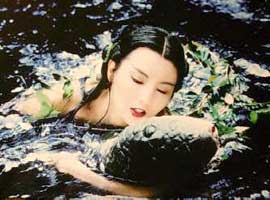 Maggie Chung is the lusty maiden & titular character Green Snake, flirting erotically with an Indian dancing girl. Hers is a thrilling, dynamic, not to say perverse personality. Despite having accumulated 500 years of merit, her ability to remain in human guise is restricted by her delight in her own snakey sensuousness. She frequently reverts to her serpent form in whole or in part. Maggie Chung is the lusty maiden & titular character Green Snake, flirting erotically with an Indian dancing girl. Hers is a thrilling, dynamic, not to say perverse personality. Despite having accumulated 500 years of merit, her ability to remain in human guise is restricted by her delight in her own snakey sensuousness. She frequently reverts to her serpent form in whole or in part.
Slithery Maggie is a delight playing Green Snake as full of pleasures & fun, often having trouble hiding her reappearing tail, & still apt to eat bugs & rodents.
Joey Wong is White Snake, with her thousand years of merit, almost fully human, & unlike Green, she has learned the difference between lust & love, for she is truly in love with the scholar Xu Xian (Hsing-kuo Wu), a weak fellow in some ways, but decent, handsome, & kind.
Xu Xian comes to visit Green & White & finds a dirty Taoist priest (Kong Lau) & his two child disciples spreading sulfur & spells around the summer cottage, attempting to destroy the serpents he knows dwell within. As these snakes are water spirits, they make it rain, to wash the sulfur away.
The Taoist is a tad clownish & White in particular is too powerful for him to harm. He is soon chased away. The real nemesis for Green & White is the Monk of the Bamboo Forest. At his first opportunity to destroy them, he wavers, having had doubts about the righteousness of having taken away the spider-reverand's hard-won merit.
Later he sees the two snake maidens using their power over water to fight a flood that is about to destroy a village, & he adds his own strength to turn the water aside, despite his belief that human beings were meant to suffer in this world of illusion. He's impressed by the apparent goodness of Green & White, but is not entirely willing to let go of his belief that Good & Evil are separate things, & demons cannot find salvation but must be suppressed.
Green in her unrestrained manner finds that she is attracted to the monk, & as White's disciple, she thinks it only correct that she find a human partner as admirable as Xu Xian has been for White. But White warns her, "That monk is not like Xu Xian. He lacks human passion."
 In winter the reptilian nature makes the maidens endlessly sleepy, & Xu Xian enjoys laying about with them. Come spring, they are again lively, & Green's libido heightens. White catches her trying to seduce Xu Xian, but is of a forgiving nature, & uses the moment as an opportunity to teach her sisterly disciple that love must be constant. She counsels Green to find a single individual to love. "But it cannot be Xu Xian." In winter the reptilian nature makes the maidens endlessly sleepy, & Xu Xian enjoys laying about with them. Come spring, they are again lively, & Green's libido heightens. White catches her trying to seduce Xu Xian, but is of a forgiving nature, & uses the moment as an opportunity to teach her sisterly disciple that love must be constant. She counsels Green to find a single individual to love. "But it cannot be Xu Xian."
One day Xu Xian tries to catch a glimpse of the women as they wrastle sensually in their bath. He sees Green's tail & flees in horror. They try to convince him he saw undulating green cloth that they were dying, but he's become mistrustful & full of fears.
During the Dragon Boat Festival, spells & rituals are conducted by all the families of the village, & rituals against snakes are among the most common. White insists Green flee for the duration, but Green has become jealous of White's affection for Xu Xian & frets White is trying to separate herself from Green. White reassures her it is only because Green has trouble keeping her human guise, whereas White will not be troubled by the spells against demons.
Rebellious Green pretends to leave, but actually takes her snake form & hides in the garden pool of the cottage. When Xu Xian accidentally spills wine in the pond, the water roils & Green rises up like a dragon to escape the polluted water. At sight of her, Xu Xian falls into a dead faint from which he cannot rally.
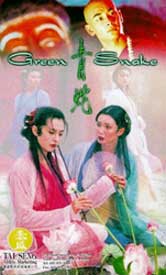 White & Green must collect the herb of life to save Xu Xian. They arm themselves with swords & head for the mountain to do battle with the herb's guardian crane. White & Green must collect the herb of life to save Xu Xian. They arm themselves with swords & head for the mountain to do battle with the herb's guardian crane.
The monk of the bamboo forest follows them, to see what they are up to, & he mistakes their snatching of the herb & harassment of the crane as evidence that they are after all evil beings.
Green remains behind in a mountain pool to keep the crane from pursing White, as White rushes to Xu Xian to save his life with the herb.
Meanwhile the tale of Green Snake gets elaboration. The monk, still uncertain if the hard-won merits of snakes has positive value, wants his own purity tested.
He offers to spare Green if she will attempt to seduce him during his meditations, which is a bargain that thrills her no end, though she would be loathe to lose such a contest with him.
Fa Hai soons loses his concentration while meditating, to Green's delight. "I win!" she sparkles to see him aroused. She has her first inklings of true human feelings, & it's sad for her that a monk is not permitted to lose this sort of battle. The theme song is reprised:
"Love begins, love ends
Love is true, love is not
Who is it? Where is it?
It is love."
Green returns to White happy to have defeated the monk by temptation, but sad that the monk would never fully fail to resist her. In her swinging mood she soon begins a fight with White, & they come to blows via swordplay, though their battle ends in regretful & sincere declarations of love.
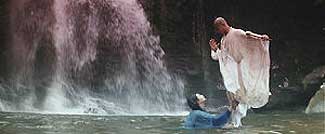 They additionally do battle with the monk, but his assaults against them have become truly halfhearted, as he is less & less convinced evil cannot change, especially when he sees that Lady White has given birth to a son. This would require her to be truly human. They additionally do battle with the monk, but his assaults against them have become truly halfhearted, as he is less & less convinced evil cannot change, especially when he sees that Lady White has given birth to a son. This would require her to be truly human.
He nevertheless feels he must save Xu Xian from the influence of demonesses. He convinces the scholar to shave his head & enter into a monastary. Fa Hei simultaneously considers Xu Xian bait for the final encounter with White Snake & Green Snake.
White having just given birth is weakened, so begs Green to go & save Xu Xian. Brave Green says, "I will. But there is love between you & me too. Have you ever treated me as human?"
A romantically tragic end for White Snake, Xu Xian, & Green Snake is about to unfold, & Fa Hei will too late realize his own error. He will raise the son of Xu Xian & Lady White, having learned that good & evil are indeed mutable, & even he has committed fault after merit.
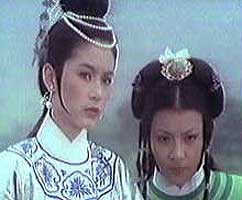 The Beijing Opera White Snake is the source of the kung-fu film White Snake, Green Snake, aka, Love of the White Snake (Zhen bai she zhuan, 1978). It is once again about two female demons or serpents who take the shape of humans & try to better themselves so that they might be reborn as true humans in the next life. The Beijing Opera White Snake is the source of the kung-fu film White Snake, Green Snake, aka, Love of the White Snake (Zhen bai she zhuan, 1978). It is once again about two female demons or serpents who take the shape of humans & try to better themselves so that they might be reborn as true humans in the next life.
Lin Ching Hsia plays White Snake who has accumulated positive energy & is on the cusp of achieving a human life. She falls in love with & marries a scholar (Chun Cheung Lam) & even though she makes him a great & devoted wife, a Taoist monk (Lee Kwan) causes marital disharmony because he cannot believe a demoness can be anything but demonic.
Some versions of the popular White Snake legend preserve the operatic music, but this Taiwan film is a straightforward romantic adventure, not at all a musical. A young & stunning Brigitte Lin is Green Snake, whose accumulation of merit is somewhat less that White's, but her comparative wildness makes her all the more appealing.
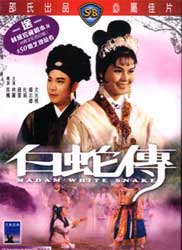 One of the musical versions is Feng Yuek's Madam White Snake (Bae she zhuan, 1962), more in keeping with the live-stage tone of the romantic fantasy-opera,Jing Shi Tong Yan by Feng Menglong (1574-1646). One of the musical versions is Feng Yuek's Madam White Snake (Bae she zhuan, 1962), more in keeping with the live-stage tone of the romantic fantasy-opera,Jing Shi Tong Yan by Feng Menglong (1574-1646).
It stars Lin Dai (aka Linda Lin Dai) as Bai Suzhen the White Snake, Margaret Tu Chuan (or Du Juan) as Qingqing the Green Snake, & Zhao Lei (or Chao Lei) is the scholar Xu Xian.
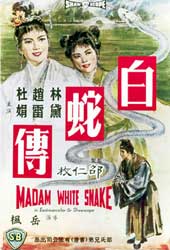 The adventures of White Snake, Green Snake & the scholar would've gone much more nicely without priestly intervention in their mixed marriage. First a Taoist tries to break up the happy couple, & then a Buddhist priest attempts the same with a bit more success. The adventures of White Snake, Green Snake & the scholar would've gone much more nicely without priestly intervention in their mixed marriage. First a Taoist tries to break up the happy couple, & then a Buddhist priest attempts the same with a bit more success.
In defense of her husband, Bai unleashes extraordinary powers that result in deaths of even innocent villagers, so that she might well have undone some of the merit her soul had accumulated in a thousand years.
But the God of Nanji (You Guangzhao), who periodically intervenes in their behalf. assures their union in the next life, when Bai will be fully human.
As an aside, the classic opera tale is also the source of the novel by E. Hoffmann Price, The Devil Wives of Li Fong (Ballantine Books, 1980), which follows the opera & film versions fairly closely, although the novel leaves out a key scene in which one of the husbands' devil wives tries to save his life by fighting a number of gods & goddesses. After many empty-hand & fully armed combat scenes, White Snake's maid Green Snake wins the magical herb that will cure the ailing husband, as occurs in the 1978 film with considerable verve.
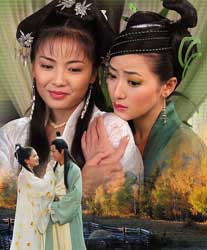 The newest television version of Madame White Snake (Bai she zhuan, 2006) is a thirty-episode series available on four discs with English subtitles. The newest television version of Madame White Snake (Bai she zhuan, 2006) is a thirty-episode series available on four discs with English subtitles.
It stars Liu Tao as White Snake & Chen Zi Han (aka Chen Sa Sa) as Green Snake, & Pan Yue Ming plays the handsome, sensitive, but in many ways very weak scholar.
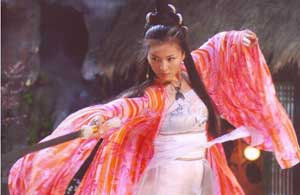 White Snake is assisted by the Goddess of Mercy in her serpent's quest for love, higher enlightenment, & eventual immortality, bringing with her on her quest the younger serpent Green Snake. White Snake is assisted by the Goddess of Mercy in her serpent's quest for love, higher enlightenment, & eventual immortality, bringing with her on her quest the younger serpent Green Snake.
As always, the good serpent demonesses are forced into unwanted battles with perhaps well meaning but misguided fanatics, notably the Taoist monk Fa Hai (Liu Xiao Feng).
But the main focus is on the romantic angle, the tragedy of Xu Xian temporarily forgetting White Snake, their trials & tribulations in pursuing a forbidden love. The level of acting is much higher than expected of television.
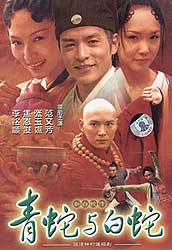 Another television version Legend of the Snake Spirits (Quin she yu bai she, 2001) starred Fann Wong as White Snake & Yuyan Zhang as Green Snake, filmed in Mandarin by a Singapore-Taiwan company. This was a forty-episode series, 45 minutes per episode. The series focused on comedy & action. Another television version Legend of the Snake Spirits (Quin she yu bai she, 2001) starred Fann Wong as White Snake & Yuyan Zhang as Green Snake, filmed in Mandarin by a Singapore-Taiwan company. This was a forty-episode series, 45 minutes per episode. The series focused on comedy & action.
Yet another Taiwanese Mandarin series was long the most famous, The Legend of White Snake Maiden (1993), which ran 50 episodes, the entire set available with English subtitles surprisingly affordably.
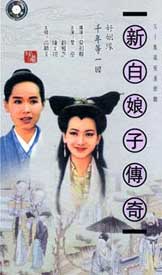 It stars Cecilia Yip Tung as (of all the characters to be cast as!) the scholar Xu Xien & Angie Gigi Chiu (aka Gigi Chiu) as White Snake. Cecilia doesn't even look butch in her scholar's drag, but just as sweet as any girl, so the series really ought to be distributed to the lesbian community who'd die from the ultra sexiness. It stars Cecilia Yip Tung as (of all the characters to be cast as!) the scholar Xu Xien & Angie Gigi Chiu (aka Gigi Chiu) as White Snake. Cecilia doesn't even look butch in her scholar's drag, but just as sweet as any girl, so the series really ought to be distributed to the lesbian community who'd die from the ultra sexiness.
The series starts off so sweetly with a baby snake about to be killed for the medicinal value of its gallbladder, when a mountain herder unexpectedly bribes the medicine collector to set the poor snake free.
Seventeen hundred years later, the appreciative snake has accumulating spiritual merits, & is able to take on the form of a beautiful woman, who falls in love with the reincarnation of that very shepherd, who is a scholar, Xu Xian.
The series format permits the story to be taken much further than in most of the feature films. When the Buddhist priest traps the demoness snake on a mountain top (in or under a pagoda in most versions), she is painfully parted from her beloved, who becomes a monk in order to be near her on the mountain.
But they had had a son who grows up to be a heroic chap, according to legend becoming the first Imperial Scholar. He grows up orphaned & when he is twenty years old, he sets out to liberate his parents so that they can be reunited twenty years later (they were parted much longer in most versions).
 Rather amazingly, Cecilia Yip also appeared in a "modern setting" adaptation of the legend entitled Phantom of Snake (Yao mei mi zong, 2000), co-starring with Jade Leung (i.e., Liang Zheng) as her sister snake-gal. Rather amazingly, Cecilia Yip also appeared in a "modern setting" adaptation of the legend entitled Phantom of Snake (Yao mei mi zong, 2000), co-starring with Jade Leung (i.e., Liang Zheng) as her sister snake-gal.
They vamp around the city's bars looking for a fossilized relic of their late brother-snake, which is in the hands of a police officer (Jimmy Wong).
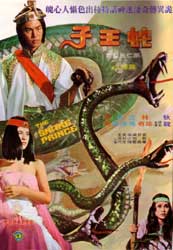 It's exploitation through & through, violent, cheap, sexy, including tasty kisses between our leading ladies. Story-wise it's as close to nonsense as these films come. It's exploitation through & through, violent, cheap, sexy, including tasty kisses between our leading ladies. Story-wise it's as close to nonsense as these films come.
Another odd variant is Lo Chen's Snake Prince (She wang zi, 1976), reversing the sex of the primary characters to be two male serpents who take on human form, & a rain-dance maiden as the beloved.
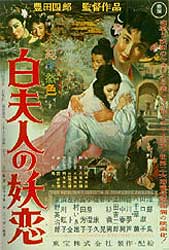 Obviously the Lady White Snake legend is a pretty darned popular story to be retold so often. As I write this, a Chinese-New Zealand co-production of yet another version, with a huge budget, is in production, to be released at the time of the Olympics in China. Obviously the Lady White Snake legend is a pretty darned popular story to be retold so often. As I write this, a Chinese-New Zealand co-production of yet another version, with a huge budget, is in production, to be released at the time of the Olympics in China.
Additional versions have been issued at intervals from other countries, including Korea's Madame White Snake (Baeksa-buin, 1960) directed by Sang-ok Sin, & Legend of the White Snake (Baek-sageon, 1978) directed by Dong-joon Choi.
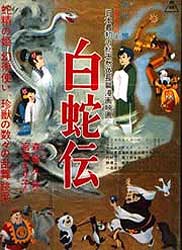 Japan also got into the theme with Shiro Toyoda's The Legend of the White Serpent aka Madame White Snake aka The Betwitched Love of Madam Pei aka Bewitching Love of the White Wife (Byaku fujin no yorn, shown in Hong Kong as Pei-she chuan, 1956). Japan also got into the theme with Shiro Toyoda's The Legend of the White Serpent aka Madame White Snake aka The Betwitched Love of Madam Pei aka Bewitching Love of the White Wife (Byaku fujin no yorn, shown in Hong Kong as Pei-she chuan, 1956).
It's an artistically filmed b/w treasure with a beautiful soundtrack. It stars the great Ryo Ikebe as the scholar Xu Xian, Shirley Yamaguchi as White Snake, & Kaoru Yachigusa as Green Snake.
Japan also produced an anime version White Serpent Enchantress (Hakuja-den, 1958). It adds novel ingredients to delight children, like our lovers' communication with animals, the two pandas having their separate adventures totally unrelated to the White Snake legend.
A very badly dubbed version of the animated feature is available under the title Panda & the Magic Serpent, widely circulating in the dvd brown market.
copyright © by Paghat the Ratgirl
|


 The primary characters are first of all Lady White, a serpent who after accumulating 1,000 years of merit is on the verge of rising to human status, & can take on human shape very easily. She has a pure & noble heart, but is also a good swordswoman, with sundry powers that are partly the result of her good merit, & partly hold-overs from her demonic origin.
The primary characters are first of all Lady White, a serpent who after accumulating 1,000 years of merit is on the verge of rising to human status, & can take on human shape very easily. She has a pure & noble heart, but is also a good swordswoman, with sundry powers that are partly the result of her good merit, & partly hold-overs from her demonic origin.
 Finding shortly thereafter the spider-reverend's prayer beads, he detects a purity in their light, & for the first time begins to wonder if his own spiritual knowledge is flawed. He becomes fearful he may commited fault after merit, have done the wrong thing in imprisoning the spider.
Finding shortly thereafter the spider-reverend's prayer beads, he detects a purity in their light, & for the first time begins to wonder if his own spiritual knowledge is flawed. He becomes fearful he may commited fault after merit, have done the wrong thing in imprisoning the spider.
 In winter the reptilian nature makes the maidens endlessly sleepy, & Xu Xian enjoys laying about with them. Come spring, they are again lively, & Green's libido heightens. White catches her trying to seduce Xu Xian, but is of a forgiving nature, & uses the moment as an opportunity to teach her sisterly disciple that love must be constant. She counsels Green to find a single individual to love. "But it cannot be Xu Xian."
In winter the reptilian nature makes the maidens endlessly sleepy, & Xu Xian enjoys laying about with them. Come spring, they are again lively, & Green's libido heightens. White catches her trying to seduce Xu Xian, but is of a forgiving nature, & uses the moment as an opportunity to teach her sisterly disciple that love must be constant. She counsels Green to find a single individual to love. "But it cannot be Xu Xian."
 They additionally do battle with the monk, but his assaults against them have become truly halfhearted, as he is less & less convinced evil cannot change, especially when he sees that Lady White has given birth to a son. This would require her to be truly human.
They additionally do battle with the monk, but his assaults against them have become truly halfhearted, as he is less & less convinced evil cannot change, especially when he sees that Lady White has given birth to a son. This would require her to be truly human.

 The adventures of White Snake, Green Snake & the scholar would've gone much more nicely without priestly intervention in their mixed marriage. First a Taoist tries to break up the happy couple, & then a Buddhist priest attempts the same with a bit more success.
The adventures of White Snake, Green Snake & the scholar would've gone much more nicely without priestly intervention in their mixed marriage. First a Taoist tries to break up the happy couple, & then a Buddhist priest attempts the same with a bit more success.
 White Snake is assisted by the Goddess of Mercy in her serpent's quest for love, higher enlightenment, & eventual immortality, bringing with her on her quest the younger serpent Green Snake.
White Snake is assisted by the Goddess of Mercy in her serpent's quest for love, higher enlightenment, & eventual immortality, bringing with her on her quest the younger serpent Green Snake.
 It stars Cecilia Yip Tung as (of all the characters to be cast as!) the scholar Xu Xien & Angie Gigi Chiu (aka Gigi Chiu) as White Snake. Cecilia doesn't even look butch in her scholar's drag, but just as sweet as any girl, so the series really ought to be distributed to the lesbian community who'd die from the ultra sexiness.
It stars Cecilia Yip Tung as (of all the characters to be cast as!) the scholar Xu Xien & Angie Gigi Chiu (aka Gigi Chiu) as White Snake. Cecilia doesn't even look butch in her scholar's drag, but just as sweet as any girl, so the series really ought to be distributed to the lesbian community who'd die from the ultra sexiness.
 It's exploitation through & through, violent, cheap, sexy, including tasty kisses between our leading ladies. Story-wise it's as close to nonsense as these films come.
It's exploitation through & through, violent, cheap, sexy, including tasty kisses between our leading ladies. Story-wise it's as close to nonsense as these films come.
